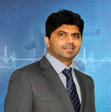Asked for Male | 11 Years
What are treatments for Hypertrophic Cardiomyopathy (HCM) in children?
Patient's Query
My doctor diagnosed Hypertrophic cardiomyopathy (HCM) during ECHO of my son. I want to know about the treatment of its?
Answered by Dr. Bhaskar Semitha
Hypertrophic cardiomyopathy is a condition where the heart's muscle thickens. This makes pumping blood difficult for the heart. Some people don't experience symptoms. Others may have chest pain, breathlessness, or fatigue. Medicines help the heart work better and reduce complication risk. Sometimes, a septal myectomy procedure improves blood flow by removing part of the thickened muscle.
was this conversation helpful?

Cardiac Surgeon
Questions & Answers on "Pediatric Cardiology" (18)
Top Different Category Hospitals In Country
Heart Hospitals in India
Prostate Cancer Treatment Hospitals in India
Kidney Transplant Hospitals in India
Cosmetic And Plastic Surgery Hospitals in India
Dermatology Hospitals in India
Endocrinology Hospitals in India
Gastroenterology Hospitals in India
Gynaecology Hospitals in India
Hematology Hospitals in India
Hepatology Hospitals in India
Top Doctors In Country By Specialty
Top Pediatric Cardiology Hospitals in Other Cities
Pediatric Cardiology Hospitals in Chandigarh
Pediatric Cardiology Hospitals in Delhi
Pediatric Cardiology Hospitals in Ahmedabad
Pediatric Cardiology Hospitals in Mysuru
Pediatric Cardiology Hospitals in Bhopal
Pediatric Cardiology Hospitals in Mumbai
Pediatric Cardiology Hospitals in Pune
Pediatric Cardiology Hospitals in Jaipur
Pediatric Cardiology Hospitals in Chennai
Pediatric Cardiology Hospitals in Hyderabad
Pediatric Cardiology Hospitals in Ghaziabad
Pediatric Cardiology Hospitals in Kanpur
Pediatric Cardiology Hospitals in Lucknow
Pediatric Cardiology Hospitals in Kolkata
- Home >
- Questions >
- My doctor diagnosed Hypertrophic cardiomyopathy (HCM) during...